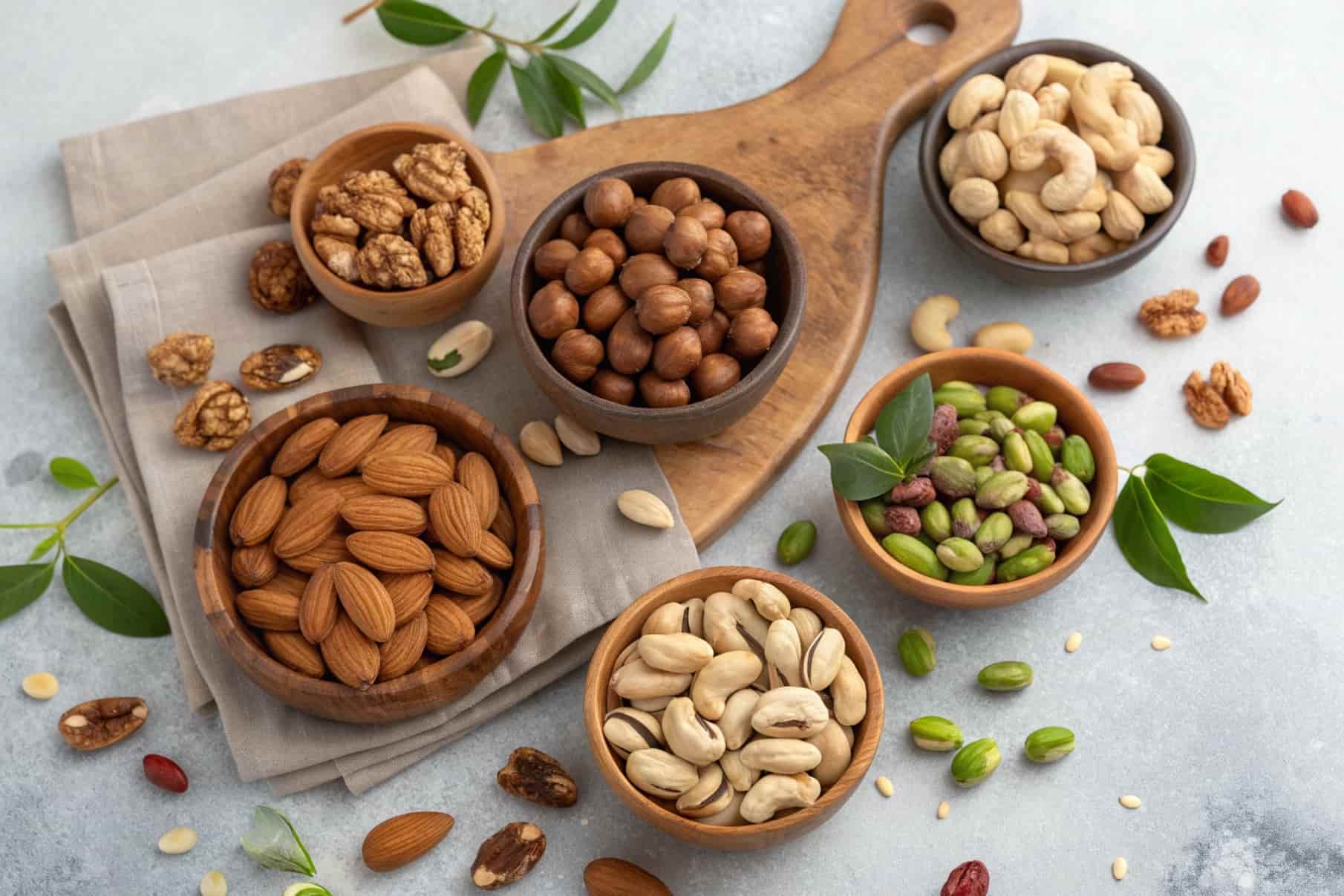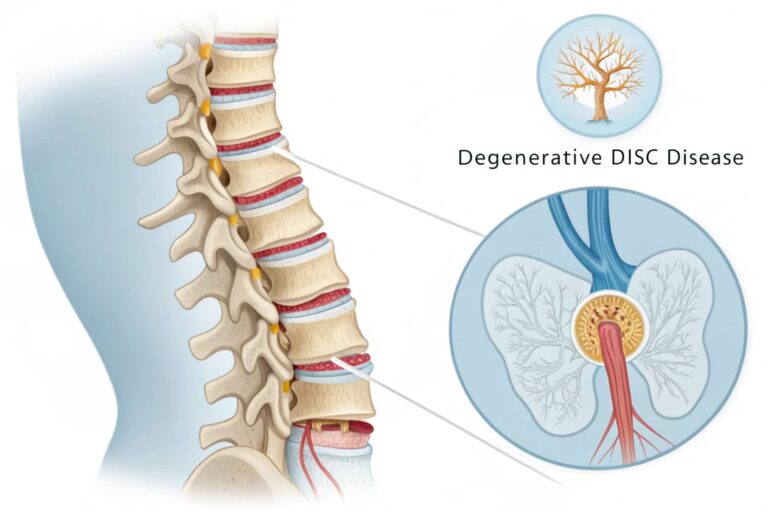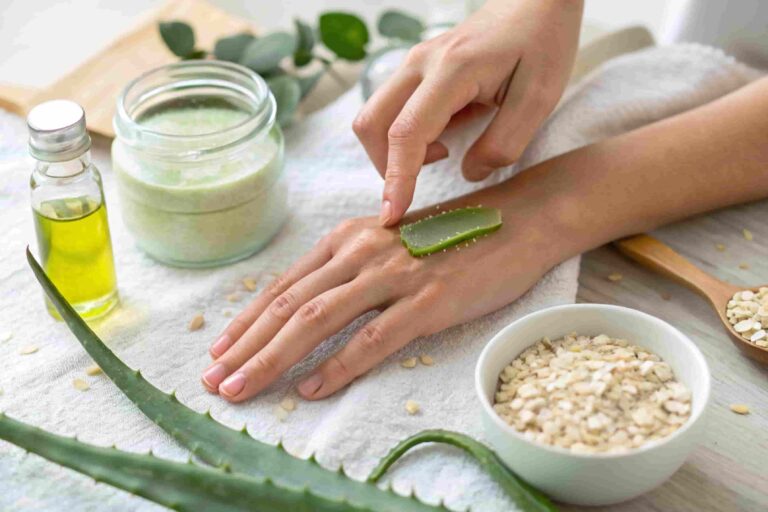What Nuts Are Bad For Kidney Disease – Avoid These Dangerous Choices!
When managing kidney disease, diet plays a key role in maintaining health and preventing further complications. One food group that often raises questions is nuts. Nuts are known as healthy snacks full of good fats, protein, and important nutrients.
But for people with kidney disease, some nuts can be harmful due to their high potassium and phosphorus content. In this article, we will explore what nuts are bad for kidney disease, why this matters, and how to safely enjoy nuts while protecting your kidneys.
Why Is Diet Important for People with Kidney Disease?
Before knowing which nuts to avoid, it is important to understand how kidney disease affects your body. Your kidneys normally help filter out waste and remove extra minerals like potassium and phosphorus from your blood. But when the kidneys are damaged, they can’t do this job well. This leads to a harmful buildup of these minerals in the body. That’s why managing your diet, especially your potassium and phosphorus intake, is very important if you have kidney disease.
Why Nuts Matter in Kidney Disease Nutrition?
Nuts are packed with heart-healthy fats, fiber, vitamins, and minerals, making them a popular snack for many. They also provide plant protein and antioxidants, which help fight inflammation. However, nuts also contain potassium and phosphorus, minerals that can be harmful if eaten in excess during kidney disease.
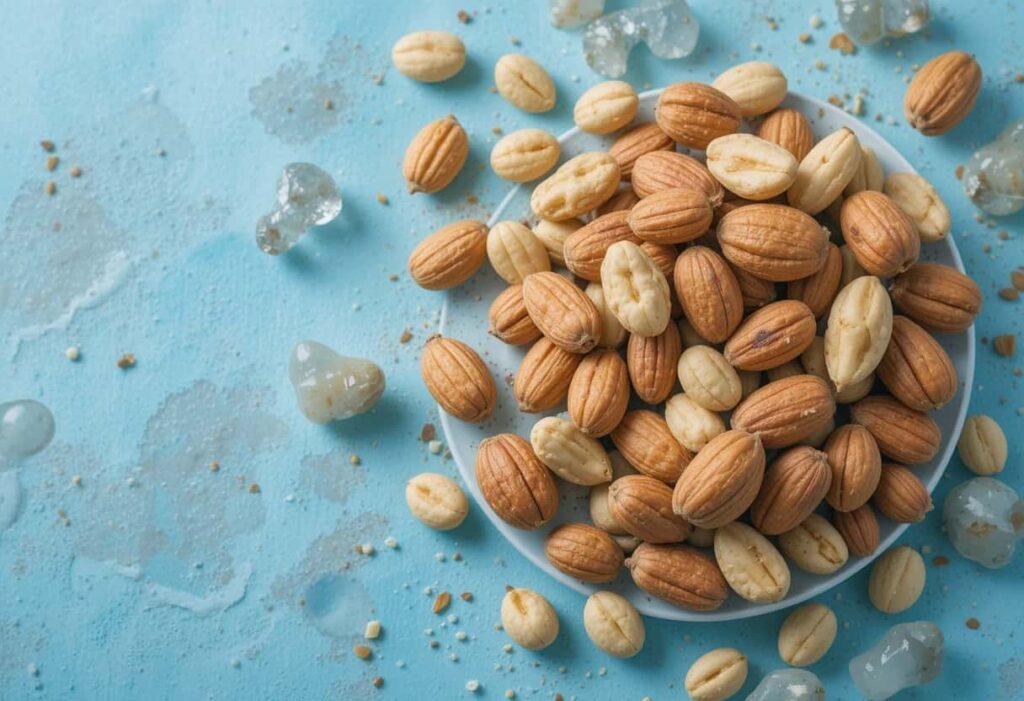
Key Nutrients in Nuts:
- Good fats: Monounsaturated and polyunsaturated fats that support heart health
- Protein: Helps maintain muscle and repair tissue
- Fiber: Supports digestion and satiety
- Potassium and Phosphorus: Minerals that can accumulate dangerously in kidney disease
Because of these minerals, some nuts should be eaten carefully or avoided depending on your kidney health and treatment.
What Nuts Are Bad for Kidney Disease?
People with kidney disease must limit potassium and phosphorus. Many nuts are high in these minerals, which can cause serious issues like weak bones, heart problems, or kidney strain.
Almonds:
Almonds contain a high amount of phosphorus and potassium. Eating too many almonds can cause dangerous mineral buildup in kidney patients. This may lead to heart issues or weak bones. People on dialysis or with advanced kidney disease should avoid almonds or eat them only in very small amounts.
Cashews:
Cashews are tasty but high in potassium and phosphorus. These minerals are hard for damaged kidneys to remove. Eating cashews can cause their levels to rise in the blood, creating health risks like bone pain or irregular heartbeat. Kidney patients should limit or avoid cashews as part of their kidney-friendly diet.
Pistachios:
Pistachios have good nutrients, but also high potassium and phosphorus levels. For people with kidney problems, these minerals can build up in the blood and harm the body. Too many pistachios may affect heart rhythm or cause bone problems. It’s safer to eat them rarely or not at all with kidney disease.
Peanuts:
Peanuts, though technically legumes, are often treated like nuts and are high in potassium and phosphorus. For someone with kidney issues, regular peanut consumption may increase these mineral levels dangerously. This can lead to fatigue, muscle cramps, or heart issues. Kidney patients should eat peanuts in small amounts or avoid them.
Mixed Nuts (with almonds or sesame seeds):
Mixed nuts often contain almonds or sesame seeds, which are high in oxalates and phosphorus. These can be harmful to people with kidney stones or kidney disease. Eating them regularly may increase the risk of stones or mineral buildup. It’s best to avoid mixed nuts if they contain these ingredients.
What nuts should you avoid with kidney disease?
People with kidney disease should avoid nuts high in phosphorus and potassium, as impaired kidneys can’t remove these minerals effectively. Almonds, cashews, pistachios, and Brazil nuts are particularly high in phosphorus, which can lead to bone and heart issues.
Walnuts and hazelnuts also contain significant potassium, risking dangerous blood levels. Safer choices in small amounts include macadamia nuts or unsalted peanuts. Always practice portion control and consult a healthcare professional or dietitian to tailor nut consumption to your specific kidney function and dietary needs.
Which Nuts Are Safer for Kidney Health Due to Lower Potassium and Phosphorus?
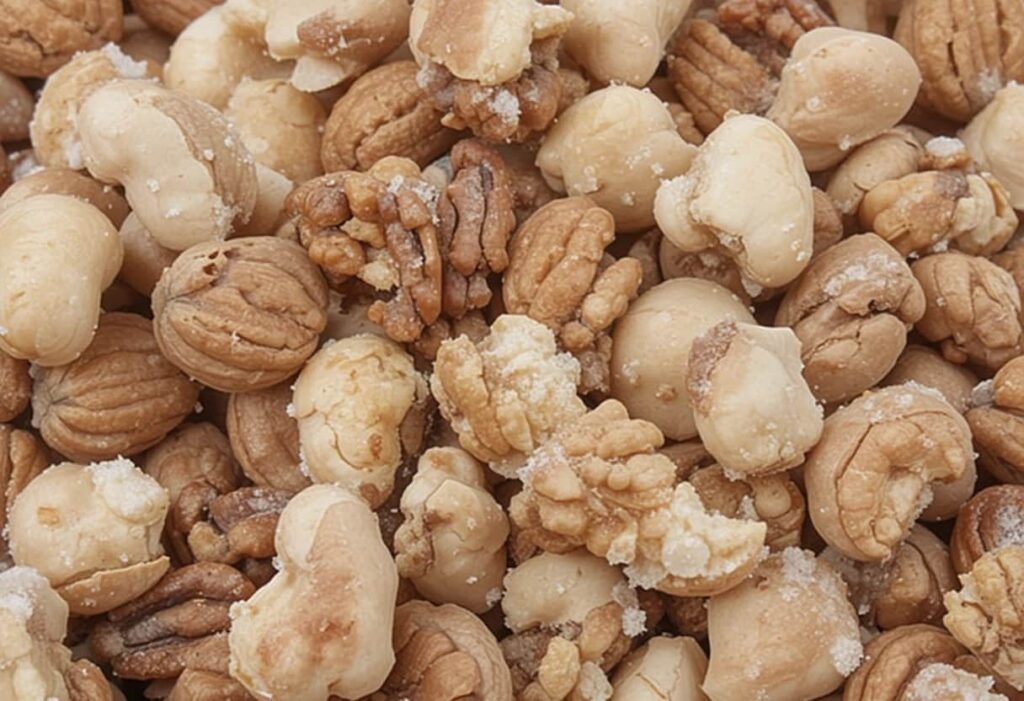
- Macadamia Nuts: Macadamia nuts are one of the best choices for kidney patients. They are low in potassium and phosphorus and offer heart-healthy fats. Eating them in small amounts helps you enjoy a crunchy snack without harming your kidneys or raising your mineral levels too much.
- Pecans: Pecans contain lower levels of potassium and phosphorus compared to most nuts. They are a good option for people with kidney disease when eaten in moderation. Their healthy fats and fiber can also support digestion and heart health without putting too much strain on the kidneys.
- Hazelnuts: Hazelnuts are safe for kidney patients when consumed in small amounts. They are lower in phosphorus and potassium than almonds or cashews. Hazelnuts also offer good fats and antioxidants, making them a nutritious and kidney-friendly nut when you want a light and satisfying snack.
- Sunflower Seeds: Unsalted sunflower seeds are a better choice for people with kidney problems. They have low potassium levels and offer some protein and healthy fats. Always choose plain versions without added salt to help control your sodium intake and support better overall kidney health.
- English Walnuts: English walnuts contain healthy omega-3 fats and are lower in phosphorus than many other nuts. These can support heart health, which is very important for kidney patients. Just be sure to eat a small portion to avoid consuming too much protein or fat at once.
How Does Dialysis Affect Nut Intake in Kidney Disease Patients?
If you are on dialysis, your ability to process potassium and phosphorus changes:
- Hemodialysis (3 times/week): You should limit nuts to about a ¼ cup serving and choose lower potassium/phosphorus nuts to avoid dangerous mineral buildup.
- Daily or nocturnal hemodialysis and peritoneal dialysis: These treatments remove more potassium, allowing for slightly higher potassium intake. Still, phosphorus intake needs monitoring.
Always consult your kidney dietitian to tailor nut intake based on your dialysis type and lab results.
Can Eating Nuts Cause Kidney Stones in Some People?
Yes, especially for people with a history of calcium oxalate kidney stones. Certain nuts like almonds, mixed nuts (excluding peanuts), and sesame seeds are high in oxalates. Oxalates can bind with calcium in the kidneys and form stones, leading to painful symptoms and complications.
If you’re prone to kidney stones, it’s important to limit or avoid these high-oxalate nuts. Instead, choose lower-oxalate options and drink plenty of water to help flush oxalates out. Always check with your doctor or dietitian before making dietary changes.
How to Safely Include Nuts in a Kidney-Friendly Diet?
Including nuts safely requires balance and portion control:
- Stick to small servings, typically ¼ cup or less, depending on your stage of kidney disease.
- Choose lower potassium and phosphorus nuts like macadamia nuts and pecans.
- Avoid nuts with high oxalates if you have kidney stones.
- Use nuts as a crunchy topping on salads or in small amounts in recipes rather than large snacks.
- Talk to a kidney dietitian about your specific needs.
What Is the Potassium and Phosphorus Content of Common Nuts per ¼ Cup?
| Nut Type | Phosphorus (mg) | Potassium (mg) | Protein (g) |
| Roasted Pumpkin Seeds | 15 | 147 | 3 |
| Macadamia Nuts | 63 | 124 | 2.7 |
| Pecan Halves | 69 | 101 | 2.3 |
| Hazelnuts | 84 | 196 | 4.3 |
| Sunflower Seeds | 100 | 80 | 1.7 |
| English Walnuts | 101 | 129 | 4.5 |
| Peanuts | 133 | 232 | 8.9 |
| Cashews | 150 | 180 | 5 |
| Almonds | 150 | 200 | 6 |
| Pistachios | 150 | 290 | 6 |
Benefits of Nuts for Kidney Disease Patients – Eat Smart!
Despite the restrictions, nuts still offer many benefits when consumed wisely:
- They improve heart health by providing good fats, which is crucial since heart disease is common in kidney patients.
- Nuts help reduce inflammation due to their antioxidant content.
- They keep you full longer, preventing overeating unhealthy snacks.
- When roasted or chopped, nuts add texture and flavor to meals, making kidney-friendly diets more enjoyable.
What are the best nuts and seeds for kidneys?
The best nuts and seeds for kidney health are those lower in phosphorus and potassium. Macadamia nuts and unsalted peanuts are good choices because they have less phosphorus than other nuts. For seeds, flaxseeds and chia seeds in small amounts can offer healthy omega-3 fats without excessive mineral load.
Portion control is essential, as even kidney-friendly options can add up. Always consult a doctor or dietitian to personalize recommendations based on your stage of kidney disease, lab results, and overall diet plan. Avoid salted or roasted varieties to reduce sodium intake. Keep hydrated and monitor your mineral levels regularly.
How to Make a Delicious Kidney-Friendly Recipe with Green Beans, Hazelnuts, and Dried Cranberries?
Here’s a simple recipe to enjoy nuts safely while keeping your kidney diet in check:
Ingredients:
- 1½ pounds fresh or frozen green beans
- ½ cup hazelnuts
- 3 tablespoons olive oil
- ⅓ cup shallots, thinly sliced
- ½ cup dried cranberries
- ½ teaspoon lemon zest
Instructions:
- Preheat oven to 350°F (175°C).
- Toast hazelnuts on a baking sheet for 10-15 minutes until skins split, then rub off skins and chop coarsely.
- Boil green beans for 4 minutes until tender-crisp, then plunge in ice water and drain.
- Heat olive oil in a skillet, cook shallots until light brown.
- Add green beans, cook 3 minutes.
- Stir in cranberries and hazelnuts, cook for 1 minute.
- Sprinkle lemon zest on top before serving.
This recipe provides flavor and nutrition with a nut lower in potassium and phosphorus, ideal for kidney patients.
Additional Tips for Managing Nut Intake with Kidney Disease – Simple Tricks for Better Health!
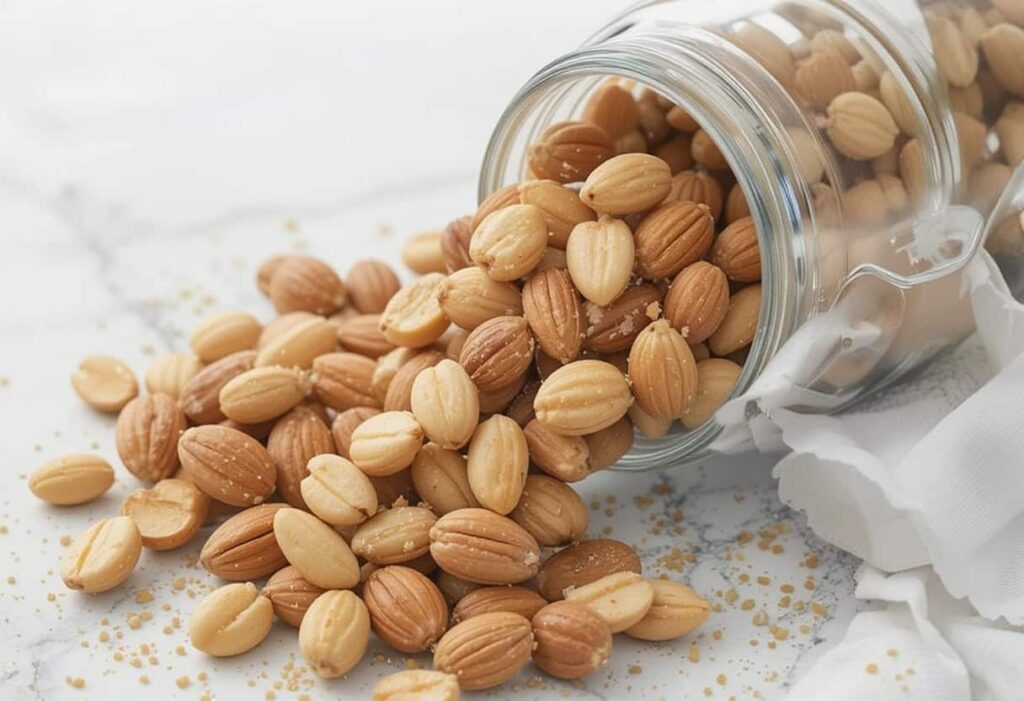
- Read nutrition labels carefully when buying packaged nut mixes or nut butters to check potassium and phosphorus content.
- Avoid salted or flavored nuts that may contain added sodium, which can worsen kidney problems.
- Spread nut intake throughout the week rather than consuming large amounts at once.
- Keep regular lab checkups to monitor potassium and phosphorus levels and adjust your diet accordingly.
FAQS:
1. Are walnuts good for kidney disease?
Yes, walnuts are generally good for people with kidney disease because they have lower potassium and phosphorus levels compared to some other nuts. They also contain healthy fats that support heart and kidney health when eaten in moderation.
2. Are cashew nuts good for kidney patients?
Cashews are not the best choice for kidney patients because they have higher potassium and phosphorus levels. Eating them in large amounts can increase the risk of mineral buildup, so it’s better to limit or avoid cashews if you have kidney issues.
3. Are peanuts good for kidney patients and creatinine levels?
Peanuts contain higher potassium and phosphorus, so they should be eaten cautiously by kidney patients. Regarding creatinine, peanuts do not directly affect creatinine levels but can contribute to kidney stress if consumed excessively.
4. Are almonds good for kidney patients?
Almonds have high potassium and phosphorus content, making them risky for kidney patients, especially those with advanced disease or on dialysis. It’s best to limit almond intake to avoid mineral buildup that can harm the kidneys.
5. Are macadamia nuts, pecan nuts, and pumpkin seeds good for kidney patients?
Yes, macadamia nuts, pecans, and pumpkin seeds are better choices for kidney patients because they have lower potassium and phosphorus levels. These nuts and seeds provide healthy fats and protein without putting too much stress on the kidneys.
Conclusion:
Managing kidney disease requires careful attention to diet, especially when it comes to nuts. Some nuts like almonds, cashews, pistachios, and peanuts are high in potassium and phosphorus, which can harm kidney health if eaten in excess.
Choosing safer options such as macadamia nuts, pecans, and hazelnuts in small portions can provide important nutrients without risking mineral buildup. Always consult your healthcare provider or dietitian to tailor nut intake safely for your kidney condition.
Related post:
